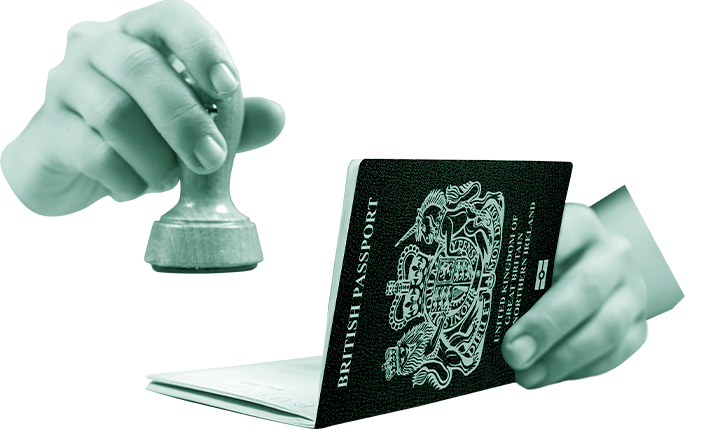Let's Talk

Need Help Urgently?
Call our 24 hour rapid response team now on 0333 311 1090
Request a callback
"*" indicates required fields


Navigating the UK immigration system can be complicated. There are many visa options to choose from. This detailed guide is all about the Charity Visa UK. It offers helpful information for those who want to make a difference through voluntary work. You will learn about the application process, eligibility criteria, and other important details. This way, you can start a rewarding experience by helping worthy causes.
The UK Charity Visa is a type of Temporary Work Visa. It is for people who want to help in the UK’s charity sector. This visa allows you to stay for up to 12 months, based on what is written in the Certificate of Sponsorship, plus an extra 14 days. With this visa, you can take part in unpaid voluntary work for a UK charity. This lets you have meaningful experiences while helping the causes you care about. The Charity Visa UK helps bring people together, and it makes the charity world in the UK better.
It’s good to know that the Charity Visa UK does not lead directly to permanent residency. But, eligible family members like spouses, partners, and children can apply to stay with the main visa holder in the UK.
A Charity Visa UK is meant for people who want to do charity or voluntary work in the UK. This visa allows charity workers to help with important causes and support organizations that need it. With a Charity Visa UK, individuals can work legally in the charity sector. They can help solve social problems, promote wellbeing, and support communities that need help. All of this is done while following UK immigration rules.

Before starting the application process, people who want to get a Charity Visa must follow certain rules set by UK Visas & Immigration. Following these rules helps ensure that they are ready for their volunteer work and can support themselves while in the UK.
These rules include factors like age limits, sponsorship needs, and financial stability. Each part is important to evaluate if the applicant is right for the Charity Visa. It also looks at how they can help the UK’s charitable sector.
Before starting the application process, people who want to get a Charity Visa must follow certain rules set by UK Visas & Immigration. Following these rules helps ensure that they are ready for their volunteer work and can support themselves while in the UK.
These rules include factors like age limits, sponsorship needs, and financial stability. Each part is important to evaluate if the applicant is right for the Charity Visa. It also looks at how they can help the UK’s charitable sector.
To get a Charity Visa for the UK, you need to have a valid Certificate of Sponsorship from a licensed sponsor in the UK. This sponsor must be a charity that holds a sponsor license. The sponsor will give you a unique reference number to use in your visa application. They also have to share information about the work you will be doing, how long it will last, and how long the sponsorship is valid.
Applying for a Charity Visa in the UK has a clear process. This process helps you move through each step, from preparation to getting your visa decision. Knowing these steps is key to having a smooth and successful application.
You will need to collect the right documents. Next, fill out the online application form correctly. You might also need to go to a visa application centre appointment. If you carefully follow these steps and stick to the guidelines, you can improve your chances of getting a positive result.

After you finish your application for the Charity Visa UK, you need to submit it at a specific Visa Application Centre. How long it takes to process your application can change. This depends on how complicated your case is and how busy the Home Office is.
You can usually get a faster decision if you give all the required documents and follow the rules carefully. It is important to submit everything correctly to avoid delays in the process.
Financial readiness is very important for a successful Charity Visa application. Applicants need to show that they can support themselves while in the UK. They should not depend on public funds. This rule helps ensure they can cover their living costs.
To meet the financial requirement, you can use your personal savings, support from the host charity, or both. It is important to look at all options and make sure the funding source fits with UK visa rules.
To get the Charity Visa UK, applicants need to have a minimum amount of money. This money is to support themselves and their family members. This rule makes sure that people can pay for their living costs without using public funds.
When applicants show they can support themselves and their family, they show they can contribute positively to the UK while doing charity work. It is important to understand and meet this financial requirement for a successful charity visa application.
To support yourself and any dependents in the UK with a Charity Visa, you need to have good finances. Meeting the UK’s money requirements is very important. You should also plan for healthcare costs and school fees for children, if you have any.
It’s necessary to think about the total cost of living as well. Having a clear financial plan can help you avoid stress while you’re here. Good financial planning is the key to having a great time in the UK.
The Charity Visa UK is given for a limited time at first. However, you can extend your stay in some cases. This lets you continue your voluntary work and help the UK’s charity sector even longer.
To extend your Charity Visa, you need to show that you are still needed for your voluntary work. You must also follow the same rules from your first visa. It’s important to check the UK Visas & Immigration guidelines for more details.

To extend your Charity Visa UK, you need to keep your charity worker role aligned with the goals of your sponsor. You should plan to keep doing charity work, or you can change to a skilled worker visa. The extension process means you will need to submit a new visa application.
You also have to pay the application fee and show a valid Certificate of Sponsorship. It is important to meet financial requirements and prove you will not need public funds. The decision on your extension usually happens faster than when you first applied for the visa.
Once your time on the Charity Visa UK ends, you can look into moving to other visa types. These will match your needs and plans. It is important to understand the visa options after the charity worker visa. Talking to immigration experts can help.
They will give you useful advice on the best visa category for your next stay in the UK. This will help make your transition easy and keep you following visa rules.

To get a UK Charity Worker Visa, applicants must meet certain needs. These needs make sure people really want to volunteer and have the right skills and permissions.
To apply for the charity worker visa, you must be 18 years old or older. You should show that you truly care about charity work, meaning your reasons match what the visa is for. It’s also important to have a valid Certificate of Sponsorship for the specific volunteer role you want.
The Certificate of Sponsorship (CoS) is an official paper from a licensed UK sponsor. It shows that the applicant has a temporary job offer that meets specific needs. This document is required and is very important during the visa application process.
The sponsor must be a UK charity that is registered with the Home Office and allowed to hire people. This licensed sponsor makes sure that the applicant meets the criteria for the Charity Worker Visa route. It guarantees that the applicant is coming to the UK for real and checked voluntary work.

The financial requirement is an important part of the application. Applicants need to show that they have enough money to support themselves during their stay. This financial stability means they can pay for their living costs, like where they live, food, transportation, and other essentials. They should not depend on public funds.
Besides showing personal funds, the sponsoring charity can also help with finances. The charity can show they are committed to supporting the applicant by formally agreeing to cover certain costs.
Applying for a Temporary Work – Charity Worker Visa takes some preparation. You need to follow certain steps. First, make sure you have all the needed papers. This includes a valid passport, a Certificate of Sponsorship, proof of money, and any other documents based on your situation.
After you collect all the documents, you can start the online application on the UK Visas & Immigration website. The application form will ask for personal details, your job history, travel plans, and other important information. It’s very important to check everything is correct.
Facing a UK visa refusal can be tough. However, it’s important to understand why it happened and what your options are. The UK Home Office can refuse visa applications for several reasons. These reasons could be not having enough documents, not meeting the eligibility standards, or worries about what the applicant intends to do.
If your visa application is turned down, don’t give up. Depending on your situation, you might be able to reapply or appeal the decision. It is a good idea to get help from experienced immigration lawyers before you take any next steps.
Once you get your UK Charity Worker Visa, it’s important to know the rules about your stay. Following these rules is key to keeping your legal status and avoiding problems.
With the Charity Worker Visa, you can only do unpaid voluntary work for the organization that sponsors you. You cannot take any paid job that is not allowed by your visa. You also cannot use public funds or get government help while you are in the UK.

To apply for a UK creative worker visa, you must meet some key requirements. First, get a valid Certificate of Sponsorship from a licensed sponsor. Make sure your sponsor’s charity work matches UK rules. Next, gather all needed documents and proof to support your application.
You also need to pay the application fee and the Immigration Healthcare Surcharge. Follow the application process carefully and on time. If you need help, consider getting professional advice to make your application easier.
Understanding what work is and following your visa rules is very important. Make sure the things you do match with your visa requirements to prevent any issues. Get to know what work you are allowed to do. Staying within these limits will help make your visa experience easier.
The UK has options for non-visa and EU nationals to visit for creative work without a long visa process. These routes let people do creative things like art, music, or cultural projects for a set time.
By using these options, non-visa and EU nationals can join in interesting creative projects without needing a formal visa. This simpler way helps international cultural exchanges and builds creative teamwork between people from different countries.
Family members can come to the UK with holders of a charity visa if they fulfill specific requirements and apply for dependent visas. These visas let spouses, partners, and children live in the UK with the main visa holder. To have a successful application, it is important to meet financial requirements and provide the needed documents.



Call our 24 hour rapid response team now on 0333 311 1090
"*" indicates required fields
"*" indicates required fields